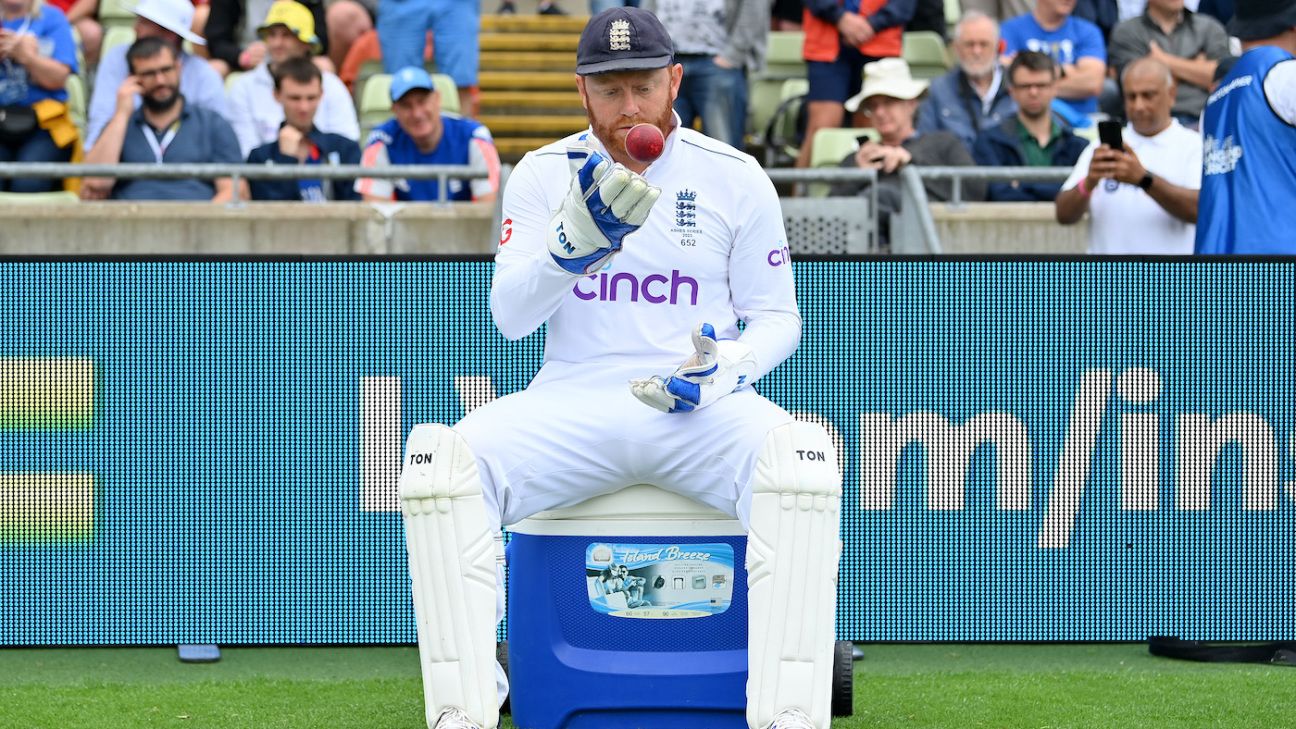
Ashes series can turn on moments like these. Three balls into Usman Khawaja's second innings at Edgbaston, James Anderson angled a ball into him from around the wicket which squared him up and took his outside edge - only for it to trickle harmlessly down to the boundary between wicketkeeper and first slip.
He could have been out for 5 off 3 balls. Instead, Khawaja settled in for the long haul once more, repelling everything England threw at him. He eventually fell to Ben Stokes' legcutter with Australia still 72 runs short of their target, but only after grinding out 65 off 197. As it proved, his contribution was enough to set up Pat Cummins and Nathan Lyon's clinching partnership.
It was one of several chances that Bairstow missed behind the stumps. He took five catches - one in the first innings, four in the second - but also dropped Alex Carey twice, once off Moeen Ali and once off Anderson. He also missed a stumping chance when Cameron Green skipped down the pitch to Moeen and was beaten in the flight.
And despite suggestions that Bairstow's missed chances might prompt England to reconsider their choice of wicketkeeper, they will not budge from their current balance either at Lord's next week or, barring injury, across the series; Brendon McCullum made that much clear after the first Test at Edgbaston.
"I thought they were pretty tough mistakes, to be honest," McCullum, England's Test coach, said. "I've kept over here before: it's not the easiest place to keep, and when the ball is spitting and bouncing out of the rough, it can be quite difficult - and when you've got to stand a little bit closer on a wicket which is a bit slower and can hurry [you] a little bit, there is a risk that… those sharp edges can be a little bit more difficult."
The Edgbaston Test was only Bairstow's fourth first-class match behind the stumps since recovering from his leg-break and he improved as the game progressed, delivering a near-faultless performance with the gloves on the final day.
"I actually thought Jonny kept really well, right throughout," McCullum added. "If you look at the way he progressed throughout the game as well, I think he found a natural rhythm, especially today [Tuesday], and I thought he did a really good job. And we know what he offers with the bat. Him coming in at No. 7 is a real weapon for us as well, so I think he'll be better for the run."
Bairstow's first innings of the match was evidence of that edge: walking out at 176 for 5, he crashed 78 off 78 balls, the third-highest score of the match. It was the sort of innings that Foakes, for all his admirable qualities, simply could not have played: he is, by his own admission, a more restrained batter, as shown by strike rate under McCullum and Stokes of 51.81.
When he was coaching Kolkata Knight Riders in the IPL, McCullum used to say: "If you can't change a man, change the man." For all Foakes' qualities with the bat, he was the odd man out in England's ultra-attacking batting line-up: "I'm not, as you'd say, Bazball," he admitted earlier this year.
Once England decided that they were sticking with their established top order, rather than promoting a middle-order batter to open, their choice came down to Foakes versus Brook, with Bairstow's return a non-negotiable on the back of his stunning summer with the back last year. Nobody who has watched England closely over the past 12 months was surprised that they opted for Brook.
And unless injury strikes, they will continue to back the same top seven over the next five-and-a-half weeks. Even if Bairstow puts down the occasional catch that Foakes might have taken, selecting any other batting line-up would amount to an abandonment of the principles that have informed England's success under this regime.
Matt Roller is an assistant editor at ESPNcricinfo. @mroller98















 Phone: (800) 737. 6040
Phone: (800) 737. 6040 Fax: (800) 825 5558
Fax: (800) 825 5558 Website:
Website:  Email:
Email: 






